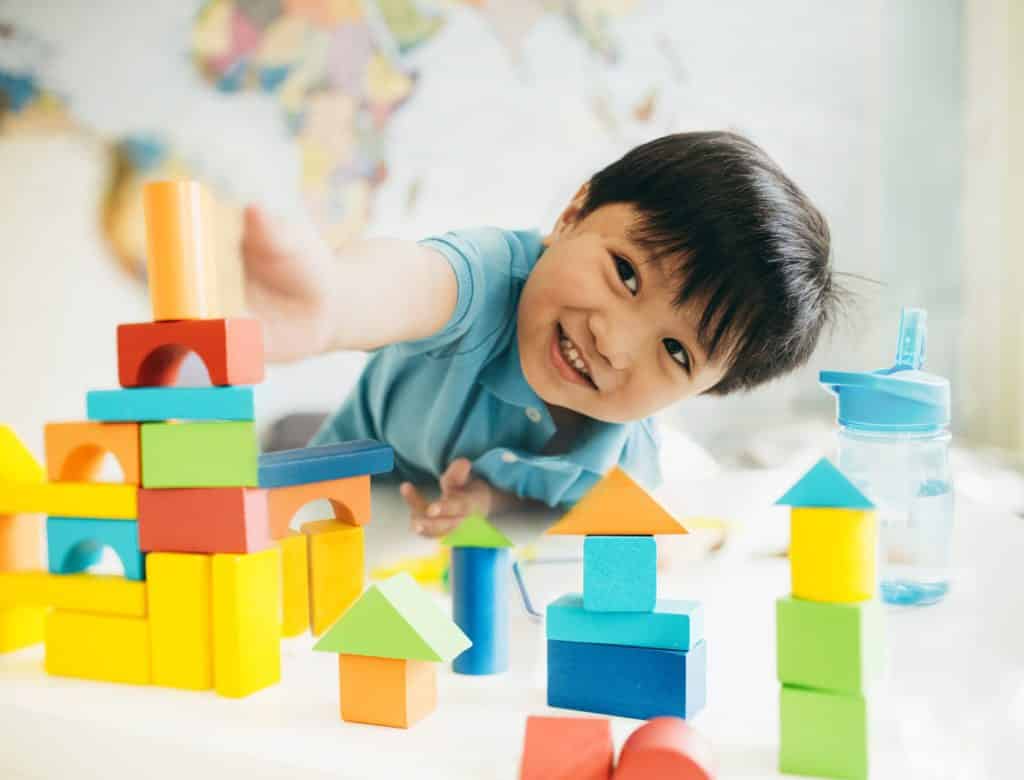It is probably no surprise to most moms that children love to play. Playing is essential for kids to get their wiggles out. However, a specific type of play is critical for brain development and allows children to gain all the skills they need physically, socially, cognitively, creatively, and emotionally. This kind of play is called “purposeful play.” Parents and teachers should encourage their children to engage in this play as often as possible.
What is purposeful play?
Purposeful play is an enjoyable activity that allows children to make meaning from their experiences. When children play, they build imagination, develop reading, language, math, and science skills, solve problems, and develop social skills, among other things. Purposeful play requires a little bit of thought and foresight on the part of the parent, but it can be achieved pretty easily. Here are some benefits and examples of purposeful play activities:
Types of Purposeful Play
Blocks & Building
Children who build with blocks, stack and dump blocks, or build a structure like a fort are learning cooperation, gross motor skills, problem-solving, and building muscles.
A great way to encourage this type of play is with Legos. Both of my children love Legos. They could spend hours building “towers” with them. When we need a go-to play activity, legos are it. To make Lego play even more challenging, encourage your kids to build monochromatic towers or to create a tower using colors to make a pattern. Help them to get creative in their building play!
Dramatic & Social Play
When kids play “house” or “school,” or give voices to their dolls or pretend to be something, they learn skills such as communication and taking turns, roles and relationships, empathy, and expressing emotions.
My kids love playing in a homemade fort and pretending to be camping. Sometimes, I’ll give them plastic plates, cups, and cutlery, and they pretend they’re having a picnic. Encouraging your kids to pretend by building a fort, a puppet show, or encouraging your daughter to play house with her Barbies or your son to pretend to be a superhero are all ways they can practice dramatic & social play.
Art Activities
Painting, drawing, cutting, and pasting, playing with Play-Doh, or stringing beads or macaroni helps children develop creativity, learn about cause and effect, use small muscles of the hands and fingers, develop patience, and learn colors.
Art play is a favorite of ours. My four-year-old daughter no longer takes naps, so we have instilled a “quiet time” that she does while her little brother takes his nap. She stays in her room and is allowed to do quiet activities. One of the ways I’ve found to keep her completely engaged in her quiet time is by installing an “art cart” in her room. I bought a three-tiered cart on Amazon and stocked it full of coloring books, blank paper, crayons, colored pencils, washable markers, stickers, glue, and kiddie scissors. Every day, she comes out of her rest time with several new masterpieces she has worked hard to create. She loves her art cart, and I love the time I have all to myself!
Puzzles
Playing with puzzles encourages children to problem-solve, sort items, see how things fit together, and master hand-eye coordination.
Puzzles are an easy way to promote purposeful play. They can be found everywhere! Large floor puzzles are perfect for younger kids, and smaller, more complex puzzles for bigger kids. You can even make your own puzzles. One of the easiest ways to make a beginner puzzle is printing an image or photo on a piece of card stock, pasting it to several large wood craft sticks (the ones that look like giant popsicle sticks), and then using a craft knife, slicing the pieces apart. Give your child all the separated pieces and watch him figure out how to put the image back together!
Music
When kids play instruments, sing, listen to music, or dance, they also learn about creative and emotional expression, sounds, tempo, pitch, body awareness, and movement.
One of my favorite ways to encourage purposeful play through music is having a dance party every day! Usually, we dance while I’m cooking dinner, but sometimes, we’ll stop everything in the middle of the day and groove our little hearts out. The kids love it, and I must admit, I love it too!
Books
Kids who listen to a story, pretend to read, look at pictures, and turn pages learn about language and vocabulary, how to express ideas, interpret pictures, and reading and writing skills.
We encourage a love of books by reading to our kids every night. We also try to keep all of their books accessible at all times, and I do my best to say yes if either of my children asks me to read to them randomly during the day. It’s hard sometimes, but I never want to discourage their love of books!
With just a little foresight and effort, you can encourage your children to engage in purposeful play in many ways. Set up their play area with stations for each category of play so that they are free to choose which activity to engage in at any given time. Remember, purposeful play is supposed to be enjoyable for kids, so give them plenty of options. And don’t forget to have fun with them when you can!






























